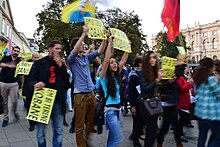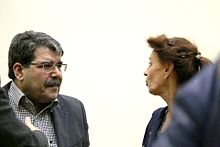
Kurdification is a cultural change in which people, territory, or language become Kurdish. This can happen both naturally or as a deliberate government policy.

Tell Abyad is a town in northern Syria. It is the administrative center of the Tell Abyad District within the Raqqa Governorate. Located along the Balikh River, it constitutes a divided city with the bordering city of Akçakale in Turkey.

The Democratic Union Party is a Kurdish left-wing political party established on 20 September 2003 in northern Syria. It is a founding member of the National Coordination Body for Democratic Change. It is the leading political party among Syrian Kurds. The PYD was established as a Syrian branch of the Kurdistan Workers Party (PKK) in 2003, and both organizations are still closely affiliated through the Kurdistan Communities Union (KCK).

The People's Defense Units (YPG), also called People's Protection Units, is a mainly Kurdish militant group in Syria and the primary component of the Syrian Democratic Forces (SDF).

The Kurdish National Council is a Syrian Kurdish political party. While the KNC had initially more international support than the ruling Democratic Union Party (PYD) during the early years of the Syrian civil war and a strong supporter basis among some Syrian Kurdish refugees, the overwhelming popular support the PYD enjoys has eroded support for the KNC in Syrian Kurdistan, losing almost all popular support.

Salih Muslim Muhammad is the co-chairman of the Democratic Union Party (PYD), the main party of the Autonomous Administration of North and East Syria. As the deputy coordinator of the National Coordination Committee for Democratic Change, he is the most prominent Kurdish representative for much of the Syrian civil war.

The Autonomous Administration of North and East Syria (AANES), also known as Rojava, is a de facto autonomous region in northeastern Syria. It consists of self-governing sub-regions in the areas of Afrin, Jazira, Euphrates, Raqqa, Tabqa, Manbij, and Deir Ez-Zor. The region gained its de facto autonomy in 2012 in the context of the ongoing Rojava conflict and the wider Syrian civil war, in which its official military force, the Syrian Democratic Forces (SDF), has taken part.

The Rojava–Islamist conflict, a major theater in the Syrian civil war, started after fighting erupted between the Kurdish People's Protection Units (YPG) and Islamist rebel factions in the city of Ras al-Ayn. Kurdish forces launched a campaign in an attempt to take control of the Islamist-controlled areas in the governorate of al-Hasakah and some parts of Raqqa and Aleppo governorates after al-Qaeda in Syria used those areas to attack the YPG. The Kurdish groups and their allies' goal was also to capture Kurdish areas from the Arab Islamist rebels and strengthen the autonomy of the region of Rojava. The Syrian Democratic Forces would go on to take substantial territory from Islamist groups, in particular the Islamic State of Iraq and the Levant, provoking Turkish involvement in the Syrian Civil War.

Euphrates Region, formerly Kobanî Canton, is the central of three original regions of the Autonomous Administration of North and East Syria, comprising Ayn al-Arab District of the Aleppo Governorate, Tell Abyad District of the Raqqa Governorate, and the westernmost tip of the Ras al-Ayn Subdistrict of the Ras al-Ayn District of Al-Hasakah Governorate. Euphrates Region unilaterally declared autonomy in January 2014 and since de facto is under direct democratic government in line with the polyethnic Constitution of Rojava.

The Women's Protection Units or Women's Defense Units is an all-female militia involved in the Syrian civil war. The YPJ is part of the Syrian Democratic Forces, the armed forces of Rojava, and is closely affiliated with the male-led YPG. While the YPJ is mainly made up of Kurds, it also includes women from other ethnic groups in Northern Syria.

Asya Abdullah is a Kurdish politician working to establish democratic autonomy in Rojava, Northern Syria. Asya Abdullah is the current co-chairwoman of the Democratic Union Party (PYD), the former co-chair of the Movement for a Democratic Society (TEV-DEM) coalition, and serves as a senior permanent member of the Syrian Kurdistan Communities Union (KCK), serving in its upper administrative body. She has presented at numerous conferences to reach out to activists, academics and world leaders to garner support for the Kurdish political project in Rojava.

AANES–Syria relations concern the military and political relations between the Ba'athist Syrian Arab Republic and the Autonomous Administration of North and East Syria (NES), a de facto autonomous multi-ethnic region in northern and eastern Syria. The Syrian government does not officially recognise the autonomy of the AANES, and advocates a centralist approach to the governance of Syria. The NES seeks the federalisation of Syria. For most of the Syrian civil war, there has been a non-aggression pact between the military of Syria and the Syrian Democratic Forces, with occasional confrontations and some cooperation against Islamist groups, in particular against the Turkish Armed Forces and the Turkish-backed Syrian National Army.

The Rojava conflict, also known as the Rojava Revolution, is a political upheaval and military conflict taking place in northern Syria, known among Kurds as Western Kurdistan or Rojava.

The Autonomous Administration of North and East Syria is a de facto autonomous region of Syria that emerged from 2012 onwards during the Syrian civil war and in particular the Rojava conflict. The current administration emphasises gender equality and pluralistic tolerance for religious and cultural diversity.
The Northern Raqqa offensive was a 2016 military offensive launched by the Kurdish-led Syrian Democratic Forces against the Islamic State of Iraq and the Levant in northern Raqqa Governorate, in order to prepare for a future attack on the city of Raqqa. The offensive was launched in coordination with airstrikes by the US-led Combined Joint Task Force – Operation Inherent Resolve. After 30 May, the offensive stalled, as the SDF shifted its focus and resources to another operation in the northern Aleppo Province.

The Shahba Canton is a political unit of the Autonomous Administration of North and East Syria, in the Aleppo Governorate. The canton was established to administer the areas captured by the Syrian Democratic Forces from the Islamic State of Iraq and the Levant west of the Euphrates, as part of the Afrin Region.

Rojava–Kurdistan Region relations refers to the relationship between the Autonomous Administration of North and East Syria, and the Government of Iraq's Kurdistan Region. While they share much culturally, they also have many political differences. There has been military cooperation with Kurdistan Region and the United States in the conflict against Islamic State of Iraq and the Levant (ISIL), although neither gives official support for Rojava or its People's Protection Units (YPG). The Kurdistan Regional Government enforced a unilateral economic blockade against Rojava which has damaged and limited the region's economy. The "Sultanistic system" of Iraqi Kurdistan stands in stark contrast to the democratic confederalist system of the Rojava.

Jineology is a form of feminism and of gender equality advocated by Abdullah Öcalan, the representative leader of the Kurdistan Workers' Party (PKK) and the broader Kurdistan Communities Union (KCK) umbrella. From the background of honor-based religious and tribal rules that confine women in Middle East societies, Öcalan said that "a country can't be free unless the women are free", and that the level of women's freedom determines the level of freedom in society at large.

The Kurdish Democratic Progressive Party in Syria is one of the oldest Kurdish parties in Syria, having been active since seceding from the Kurdistan Democratic Party of Syria the 1960s. Prominently led by Abd al-Hamid Darwish for much of its history, who was described as "one of the last remaining of the original Kurdish political activists", the PDPKS serves as the Syrian sister party of the Iraqi Patriotic Union of Kurdistan. Known for its moderate and conciliatory politics, the party has sided at different times during the Syrian Civil War with the Syrian opposition, the Ba'athist government, the Kurdish National Council, and the Democratic Union Party.

The Peshmerga Roj, also known as Rojava Peshmerga, are the military wing of the Kurdish National Council in Syria. They are pro-KDP and take orders from President Barzani of Iraqi Kurdistan.
























